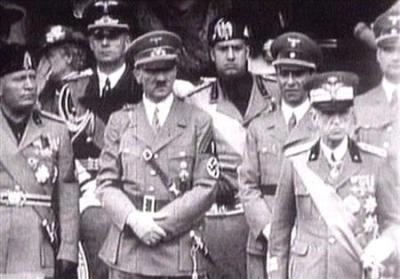Hitler’s home movies are being digitized: What your reaction says about us

Adolf Hitler is wearing a white double-breasted jacket and black trousers. On his arm is a red band with a black swastika. In another scene, he wears a gray suit with a fedora and talks with Heinrich Himmler, the overseer of the Holocaust camps.
These are some of the home movies shot by Eva Braun and her friends at the Berghof, Hitler’s retreat in southeastern Germany. Braun was Hitler’s longtime girlfriend and briefly his wife. The Alpine scenery in the background is stunning.
We know about these movies because the National Archives is restoring and digitizing them. The entire four hours of footage should be completed this month.
How I react to Hitler
When you saw the headline and read the accompanying story, what was your reaction?
Mine was one of disgust mixed with curiosity. No figure in modern history conjures (or deserves) more revulsion than Adolf Hitler. At the same time, to see him as he was, recorded by friends in a relaxed environment, is historically unique.
What I didn’t feel was fear.
Neither I nor anyone in my family was threatened personally by the Holocaust. I was obviously not old enough to fight the Germans in World War II. Due to my longtime love for Israelis, I grieve for them when Hitler’s name and legacy come up. But I feel no existential angst.
For most of us, most of the bad news in the news feels the same way.
A recent gas explosion in a North Carolina building killed one person and injured seventeen others. A twenty-year-old college student in South Carolina died after what is being called an “accidental fall” at a fraternity party last weekend.
We feel sorrow for these victims and their families, but unless we know them personally, they don’t touch us personally. Even reports that California is overdue for a major earthquake don’t affect us viscerally unless we live in California or know someone who does.
What has and hasn’t changed about death
You and I live in a day when technological advances have insulated us from the constant threat of death. Or so we think.
There was a time when hunger, disease, war, natural disasters, and predators were an ever-present reality for most humans. Today, government programs keep even the most impoverished of us from starvation. Medicine is more advanced than ever.
Wars are fought overseas by volunteers and technology. Natural disasters still endanger us, but modern buildings and response systems are better than ever. Predators are seldom an issue for urban and suburban dwellers.
As a result, death seems less a present-tense threat than perhaps at any time in human history. Of course, this appearance is not reality. It is still “appointed for man to die once, and after that comes judgment” (Hebrews 9:27). It is true for each of us that “you do not know what tomorrow will bring” (James 4:14).
There’s another crucial spiritual principle here as well.
When no one “dies”
At sixty years of age, I’m old enough to remember when one of the main appeals of Christianity was its promise of life after death. In a world where humans were frail and life was fickle, being prepared for death was obviously a good thing.
Today, we have euphemized death and anesthetized ourselves to its reality. Few people die at home. Few people witness the deaths of others firsthand. No one actually “dies”—they “move on” or “go to a better place.”
Since few people are afraid of dying today or of going to hell when they do eventually “depart,” our appeal to them as Christians can no longer be based primarily on the benefits of our faith for the next life.
As a result, it is vital that we show our culture why following Jesus is the best life in this life.
God’s plan is “good and acceptable and perfect”
Jesus came so that his followers “may have life and have it abundantly” (John 10:10). God’s will for us is “good and acceptable and perfect” (Romans 12:2). He intends to “supply every need of yours according to his riches in glory in Christ Jesus” (Philippians 4:19). The Lord “is able to do far more abundantly than all we ask or think, according to the power at work within us” (Ephesians 3:20).
Have you made your Father the King of your life today (Matthew 6:33)? Have you asked his Spirit to take control of your day (Ephesians 5:18)? Have you prayed for the Spirit to manifest his “fruit” in your life (Galatians 5:22–23)? Will you tell someone what God has done for you so they can experience his incredible grace and love (Mark 5:19)?
If you and I live out all that God has for us today and tell others how they can find the life we have, our witness to our post-Christian culture will be compelling and powerful.
Consider an example.
Focus on this life for the next life
Chris Seiple is a graduate of Stanford and the Naval Postgraduate School with a PhD from The Fletcher School of Law & Diplomacy. He is a former Marine infantry officer and a founding member of the Pentagon’s Strategic Initiatives Group.
He is also living with stage 4 cancer and a brain tumor.
Writing in the Washington Post, Dr. Seiple focuses on living today while trusting Jesus for tomorrow. He testifies: “I am grateful for the blessing of living in the present, between the ‘already’ and the ‘not yet.’ In the Bible, Jesus asks his followers: If he made and cares for the ‘lilies of the field’ in all of their finite beauty, how much more will he care for us?”
Dr. Seiple concludes: “I believe death is but the doorway to the rest of life, but until it is time to step through, I want to live like the lilies, expectantly, with enough for today.”
So should we.
Originally posted at denisonforum.org





















